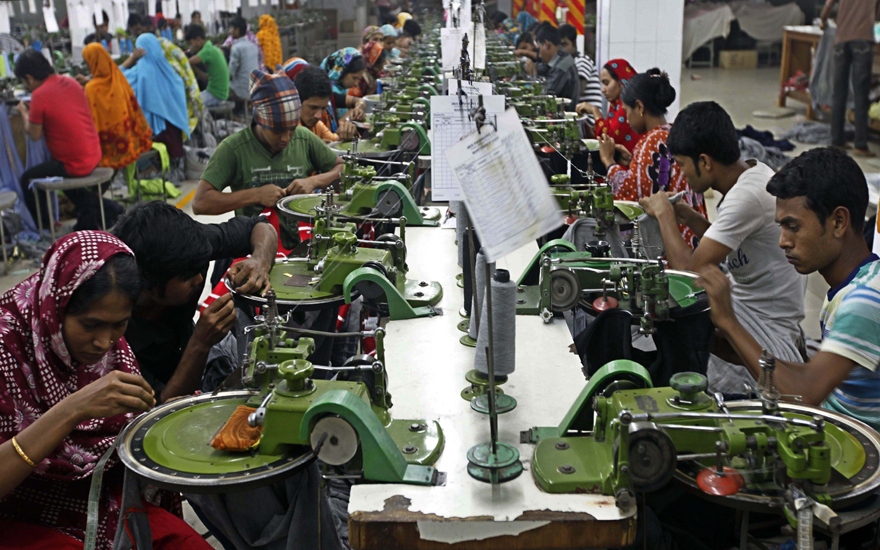The High Price of Cheap Labour
By Sama F | Newsbeat International | Published 12 years ago
In perhaps the most haunting photograph that came to define the terror of the Bangladeshi factory collapse in Savar, an industrial suburb a few miles north of the capital of Dhaka, a young couple hold on to each other in a final embrace under the rubble of Rana Plaza. Just a few days before the photograph caught the public’s attention, Bangladesh’s Prime Minister Sheikh Hasina appeared on CNN and infamously used the words, “accidents happen,” to describe the wreckage, while body after body was removed from the debris in a frantic rescue operation with the fatalities increasing each day. The photograph of the unnamed couple, taken by Bangladeshi student Taslima Akhter, became a reminder of the high human cost of cheap labour. When “accidents” occur repeatedly, they are no longer accidents, but examples of criminal callousness towards the lives of others.
Over 1,120 workers, the majority of whom were women, lost their lives in the collapse of Rana Plaza, an eight-storey structure that was built three storeys above its building permit and housed labour for many western retailers.
Bangladesh is one of the leading producers of garments, constituting about 80% of its total exports, with international manufacturers flocking to the country for its 3.6 million strong cheap and highly skilled labour. Factory owner, Mohammad Sohel Rana — a man with close links to the ruling Awami League party, which has distanced itself from him since the incident — was said to have ignored warnings from building inspectors about cracks in the structure caused by heavy equipment just the day before the tragedy. While the shops and banks on the lower floors were shut down and bank employees told not to come to work, the apprehensive factory workers who worked on the top floors were threatened with a month’s salary cut if they did not show up to work on April 24, the day of the collapse. The disparate treatment of white and blue collar workers speaks levels about the appalling treatment of labour in Bangladesh.
The Rana Plaza catastrophe highlights massive structural and ethical issues within the Bangladeshi workplace — a country that is no stranger to workplace hazards. The incident will undoubtedly go down in history as the worst industrial catastrophe, yet it occurred just five months after the Tazreen Fashion factory fire in Ashulia, another suburb of Dhaka, which resulted in the death of more than 117 workers. And a year before, Aminul Islam, president of the Bangladesh Garment & Industrial Workers Federation and a former garment worker himself, was brutally murdered. Labour protests are repeatedly and ferociously suppressed, most famously in 2010 when hundreds of workers and trade unionists, including Aminul Islam, were arrested for demanding higher wages. The government promises reforms after every factory related disaster, but makes little substantial change.
As thousands of workers across Bangladesh’s industrial sites staged riots the next day, demanding accountability by blocking roads and vandalising property, the question arises as to who should be held responsible for failing to ensure workers’ safety: the Bangladeshi state, the powerful factory owners or the numerous western retailers who benefit from the country’s cheap labour. Bangladesh currently offers the lowest minimum wages in the world, even less than China. Sohel Rana himself blamed the international retailers, who are often in competition with one another to produce cheap clothes, for the tragedy. He claimed that they forced him to keep the factory running despite warnings by building inspectors, saying they would “face huge losses and shipments would be canceled if the factories were closed for even one day.”

The photograph of the unnamed couple, taken by Bangladeshi student Taslima Akhter, became a reminder of the high human cost of cheap labour. When “accidents” occur repeatedly, they are no longer accidents, but examples of criminal callousness towards the lives of others.
Rana Plaza, in particular, housed five factories that catered to a number of major western retail giants: H&M (Sweden) which is the biggest buyer of garments made in Bangladesh, C&A (Netherlands), Primark and Tesco (United Kingdom), Zara and Mango (Spain), Benetton (Italy), Joe Fresh (Canada) and the largest retailer in the world, Walmart (United States). Other countries with businesses at Rana Plaza include Denmark, France, Germany and Ireland.
With mounting outrage over the deaths, and activist groups such as Avaz and War on Want organising international petitions signed by thousands of people to make the global retailers accountable for the overseas conditions of overseas workers, many of these companies have expressed deep remorse about the accident. They have since signed the European IndustriALL and UNI Global Union drafted ‘The Accord on Fire and Building Safety in Bangladesh:’ a five-year legally-binding contract requiring them to ensure and pay for minimum fire and building safety standards and inspections and incur the cost of renovation and repairs. In addition, companies have to end business relations with any factory that refuses to make necessary safety improvements. While the basis of the contract was drawn up over a year ago, it was only after the Rana Plaza collapse that 24 companies including Primark, H&M, Benetton, Tesco, Zara, Mango and C&A came on board to sign it. Tesco has additionally said it would create a fund of $1.53m to support developments across the industry in Bangladesh, and Primark said it will compensate victims who worked for its supplier by providing long-term aid for children who lost parents, financial aid for those injured and payments to families of the deceased.
Previously, only two firms had been prepared to sign the accord: PVH, the parent of Calvin Klein and Tommy Hilfiger, and the German Tchibo. The 15 other companies that have also signed the contract are: Marks & Spencer, El Corte Inglés, Carrefour, KiK, Helly Hansen, G-Star, Aldi South, Aldi North, New Look, Mothercare, Next, Loblaws, Sainsbury’s, N Brown Group and Stockmann.

However, 14 others have refused to sign it, including US multinationals Gap and Walmart, which have been most vocal in their opposition to the legally-binding aspect of the safety pact. Gap, which claims to do business with 78 Bangladeshi factories and often uses humanitarian campaigns as part of its marketing, will sign the accord only if the passages on how disputes are legally resolved are altered. And although Walmart has said it would conduct thorough safety inspections and invest in fire hazard safety at the 34 Bangladesh factories with which it works and included “new principles that actually go further than the accord,” it has come under condemnation from various human rights and non-governmental organisations.
Many other US retail giants have also refused to sign the pact, including JC Penney, Macy’s, Sears, Target and American Eagle Outfitters. Meanwhile Disney has announced that it would be pulling out from the country, halting all manufacturing ties. Others are expected to follow suit.
There are some who are quick to point fingers at western retailers as the sole perpetrators behind working conditions in Bangladesh, linking global capitalism to modern forms of slavery. However, the Bangladeshi economy depends on and has benefited from the presence of multinational companies which have provided employment to close to four million workers. Bangladeshi Nobel Peace Prize Laureate Mohamed Yunus also wrote about how multinationals have been instrumental in helping millions of Bangladeshis, particularly women, gain financial independence. As Bryan Walsh, a reporter from Time magazine, said “there’s a difference between accepting that workers are being paid sweatshop wages to make our incredibly inexpensive clothes — the minimum wage is $36.50 a month — and accepting that they must labor in deathtraps.” H&M CEO Karl-Johan Persson has additionally said they would like to see salaries revised yearly, as is the case with most countries. “We’re definitely willing to pay more but we have to find a good, sustainable way for the workers and for the country as well,” he added. Canadian retailers Joe Fresh have also said they have no plans of leaving the country. Joe Mimran, one of the executives of the clothing line said at a conference, “Properly inspected, well-built factories play an important role in countries like Bangladesh.” He added, “Recent events have shown we should be auditing for building standards, something that has never been done before.”
While these companies certainly have a responsibility towards their overseas workers as they do to workers in their own countries, and it would be naïve to assume they are ignorant of the conditions in these factories, the brunt of responsibility must ultimately lie with the Bangladeshi state itself, mired in nepotism, corruption and mismanagement. Bangladesh offers the lowest minimum wage in the world, with workers not even being allowed to form unions without the factory owner’s permission. The Bangladeshi parliament itself includes many influential garment factory owners who are members of the main political parties or have links to notorious mafias. Sohel Rana, now sitting in jail on charges of murder and considered to be the most hated man in Bangladesh, was a member of Jubo League, the youth wing of the Awami League party. The head of a government appointed investigation into the April 24 collapse, Main Uddin Khandaker, referred to Rana as a “by-product of our rotten politics,” and accuses Rana of defying regulation laws and using deficient construction materials. The Rana Plaza itself was bought on illegal land, a swampy terrain.
In total, there are only 18 inspectors to monitor close to 100,000 factories in the Dhaka area alone, and fines for any breaches are too low to generate any real reforms. The government has now taken steps like increasing the minimum wage to $38, increasing the number of inspectors by 200 and made amendments to its 2006 Labour Act by giving workers the right to form unions without permission from factory owners. But this is a little too late — at least in the eyes of the families of the Savar victims.
With 1,127 dead and 2,250 injured, one wonders whether any lessons have been learnt. As headlines of eight people killed in a fire that swept through another garment factory in Dhaka’s Mirpur district appeared just two weeks after Rana Plaza, it would seem not.
The writer is a journalist and former assistant editor at Newsline.



